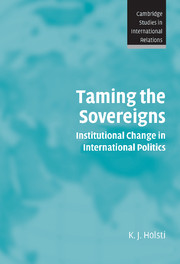Book contents
- Frontmatter
- Contents
- List of tables
- Preface
- 1 The problem of change in international relations: rhetoric, markers, and metrics
- 2 States and statehood
- 3 Territoriality
- 4 Sovereignty
- 5 International law
- 6 Diplomacy
- 7 International trade
- 8 Colonialism
- 9 War
- 10 International institutions: types, sources, and consequences of change
- References
- Index
- CAMBRIDGE STUDIES IN INTERNATIONAL RELATIONS
5 - International law
Published online by Cambridge University Press: 22 September 2009
- Frontmatter
- Contents
- List of tables
- Preface
- 1 The problem of change in international relations: rhetoric, markers, and metrics
- 2 States and statehood
- 3 Territoriality
- 4 Sovereignty
- 5 International law
- 6 Diplomacy
- 7 International trade
- 8 Colonialism
- 9 War
- 10 International institutions: types, sources, and consequences of change
- References
- Index
- CAMBRIDGE STUDIES IN INTERNATIONAL RELATIONS
Summary
Politically distinct groups, whether tribes, city-states, kingdoms, or other types of polities, have been in various kinds of contact with each other for more than 7,000 years. For some, connections were thin and intermittent. An example would be the irregular and limited trade that took place between the Chinese Empire after 220 BC and its Roman counterpart. At the other end of the spectrum would be the regular and patterned transactions between many of the Chinese states of the “Spring and Autumn” and “Warring States” periods (771–220 BC) or the relations between the city-states of Greece between the seventh and third centuries BC.
Although considerable variation existed in the nature of these relationships, many were conducted within the context of certain rules and norms indicating proper behavior. We find that even in relations between groups from different cultures, certain norms typically helped regulate relations. Among these would be the norm that treaties or other forms of contracts are binding, or that messengers or other forms of diplomatic representation should enjoy certain immunities. Even in warfare, polities often observed certain rules or limits. These rules were usually culture-specific. In warfare between polities of different cultures, the lack of restraint was typical. The Romans defeated Carthage twice and in the final Punic war, they razed the city, slaughtered all its inhabitants, and sowed the ground with salt. The military relations between Christians and Muslims during the era of the crusades were similarly brutal.
- Type
- Chapter
- Information
- Taming the SovereignsInstitutional Change in International Politics, pp. 143 - 177Publisher: Cambridge University PressPrint publication year: 2004
- 2
- Cited by

